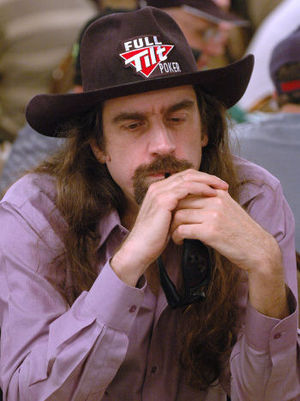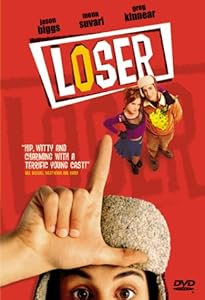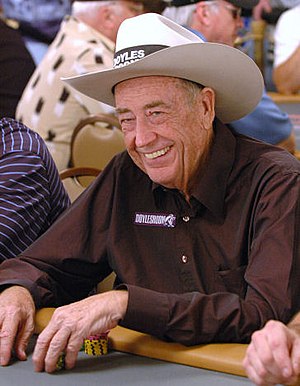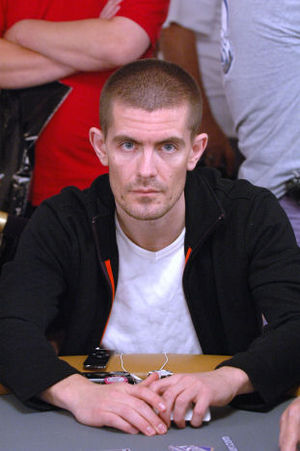Anger and PokerI admit I have a temper. While it runs in the family, it's my responsibility to control it.
The first few years I started playing poker tournaments, I never got angry when I took a bad beat. Never. I used to find it stupid for players to get so mad about losing.
 Image by Akbar Simonse via Flickr
Image by Akbar Simonse via Flickr
The tournament director at one of my local clubs used to tell people I was the nicest guy at the club. I think he may have got confirmation of that opinion when the following situation came up:
I had arrived on-time to a Sunday afternoon poker tournament at Lucky Chances. It takes about 45 minutes for me to get to the club. The buy in was $220. Everyone gets seated as the first hand is dealt. I am in the 6 seat, and the big blind is in the 3 seat. The blinds are $25-$50, and everyone has $2,000 in chips.
I get dealt A-K offsuit and I'm the first in the pot with a raise to $150. Everyone folds to the big blind who calls.
The flop is K-7-2 rainbow. I like that flop.
The big blind looks at the flop and does nothing for about 20 seconds. Then he says, "all-in."
Uh-oh. What could this guy have to move all-in with that flop? What hands can he possibly be holding to make a play like that? I am also wrongly thinking that I just got to the club, and I'd feel stupid driving home after a few minutes of play. I'm thinking and thinking.
Now my opponent says to the dealer, "clock."
The dealer calls over the tournament director. He walks over and tells me I have one minute. I really didn't know what to do.
And then it hits me. This is the guy who did the same thing about one month ago. When his opponent folded, he showed a total bluff.
"I call!" I say it loud to make sure the TD hears me.
I turn over my A-K and my opponent turns over Q-6 suited. The players at the table react by poking fun at this guy. He's got nothing. No backdoor nothing.
The turn is a 6.
The river is a....Q!
Now the table reacts with that "Oh!!" And start laughing. I don't get angry. I joke to my opponent, "you're good," as I get up from my chair and calmly walk away. I guess the tournament director expected me to storm off.
While it bothered me that I lost that hand, it's just poker. I actually felt good about making the call.
The point is that I never got angry playing poker. It always seemed a stupid waste of energy.
And then internet poker arrived.
Internet PokerI did not jump into playing online poker at first, since I only had a Mac. Internet poker only worked on PC's in those days.
I was a winning tournament player at the clubs, so my Dad kept pushing me to get a PC. I finally relented and got a cheap PC laptop on ebay. It was a horrible computer.
When it arrived, I signed up with Ultimate Bet. I had to sign up with one of those deposit services, I think it was called firepay. It took a couple of days to get the money into UB.
Anyway, when I finally had money in UB, I entered my first online poker tournament. I had been playing for $200+ at the club, so I entered a $105 event. I could not believe how bad everyone was playing. As it got down to the final table, I was in third place.
After another 15 minutes, it was down to 6 players and I was tied for the chip lead. I knew for sure, I was going to win.
The next hand was dealt and I was under the gun. Pocket Aces! Since a couple of players were low on chips, I was thinking about slow-playing. But I decided to raise. I selected the amount of my raise. When I went to press the button to raise, the computer screen goes dead. As does everything else in my apartment.
In fact, the power to my area of town goes out. Unreal! What am I suppose to do? This never happened to me at a card room. I was going to call UB, but I didn't have the internet connection to find out their phone number.
After about one hour, the power goes back on. I log in to UB as quick as possible. I can't even find the game I was in anymore!
I call up UB. The person tells me that I was blinded off, and ended up in 5th place. That sort of pissed me off.
In fact, the more I played online poker, the more I got pissed about playing poker. So many unreal, stupid things happen all the time. Bad beat, after bad beat, after bad beat. It's so absurd. Did I feel like breaking the mouse, keyboard, and computer? Yes, yes and yes.
That anger about the game was present even when I played at the card rooms. I would be pissed when I lost...not some of the time, every time I lost. The funny thing is that I was a winning player overall!
Despite the winning, I couldn't take the way I was losing. It was just so stupid. It would just get me so pissed.
The result was that I just stopped going to any local major events, and cut back on my online play. Of course, it did give me time to write a book or two.
Why My Anger Is Practically GoneThe past year I have been playing a few more tournaments. One thing I have learned is that poker tournaments really are a combination of skill, luck, luck and luck. Players today are much better than they were before. The skill difference among very good and great players are not nearly as wide as they used to be.
My understanding of the game is deeper than before. And it has resulted in my being able to put anger aside in these events. There is no reason for you or me to get angry when you realize the following is true:
1.
You are never that big of a favorite in any heads-up, all-in situation.No one is a big favorite. Is 4-1 really that big of an edge? No! In horse racing a long shot is 20-1 or higher. The guy with the small pair will beat your pocket aces one out of five times. (One out of three times online:))
2.
You have to play to win. Which means you have to push the action.You will rarely get enough big hands to take you all the way to a win. (I think it's happened once where I got pocket Aces six times in a tournament--I still only finished 2nd!) Pushing the action results in being in more precarious situations and risking all your chips. It makes the game a lot less emotional when you know that anything can happen.
It used to be that I never put a bad beat on anyone because when the chips went into the middle I was always ahead. Now, I actually put bad beats on players...and get called names. But that's what happens when you embrace the risk in the game.
3.
The top poker stars don't win tournaments that often.Check the stats on the name players. The top poker stars today are getting better results in tournaments that are not the no-limit events. Why? They have a lead on knowledge and experience on these other games, like they used to have in no limit events. Also, there are fewer players to beat.
Chris Ferguson took $0 and turned it into $10,000--which is amazing. But you know what..it took him 7 months to win enough money in a tournament to play in games higher than a buck or two.
4.
The top poker stars, the best players online and the best players at your local club have a big edge: it is their net worth.For top poker stars, if it wasn't for their financial ownership and/or sponsorships with online poker sites, they would be having a much more difficult time and not be taking as many risks in a tournament. You may not know it, but there is a lot of deal making going on in major events.
It's like that player at the 2008 WSOP who told Hellmuth...it was something like.."No, you are an idiot! I put in my $10,000 and play my way. You risk nothing, you put up no money to play. You shut up!"
The fact it is an uneven playing field.
It's also true online and at your local club as well. Online players will have bigger bankrolls and will enter hundreds of events in a year. They play multiple events at the same time, so at a few of those events they can get enough chips later on, which can put them in an excellent position to win. They can use their chip lead to bully opponents in the later stages of the event, and it gives them a big edge.
You and I will be playing one event and put all our attention and effort into that one game. If we get knocked out, we shut off the computer.
You may not know it but it's also true at your local club. The players who have the biggest net worth, are the ones who can afford to take the biggest risks. More risk equals more reward. There is this one player (he dresses like he's homeless) who gets knocked out more often than other players, but he will also get to the final table with more chips, more often than other players.
I thought he was a great player, until I jokingly said to the tournament director, "That guy plays like he already won the main event." The TD replied in a serious tone, "Mitchell, he's one of the richest men in the Bay Area." I was shocked.
By the way, I am not saying that these star poker players are not the best poker players. I am saying that the top players have an edge but not as big as used to be in no limit tournaments. There are a lot more "best" or "almost as good" poker players, which results in luck being more and more of a factor in any one event.
SuggestionI no longer get angry when I get knocked out with a bad beat. I am disappointed, but not angry. I mean it's just part of a game that is filled with skill but a lot more luck.
Now I try to be the player who is a little more aggressive and pushes the action a little more than my opponents. I will get knocked out sooner, but I will get more chips faster.
Give it a try. Embrace the risk. Take chances. Don't be angry if it doesn't work the first time, the first 10 times or the first 20 times. It doesn't matter, it's only a game...learn from it and improve your game.
Just please remember that you should not be playing with money you can't afford to lose. A reminder that is especially pertinent in today's economy.
 Image via Wikipedi
Image via Wikipedi




![Reblog this post [with Zemanta]](http://img.zemanta.com/reblog_e.png?x-id=85c2eff4-1ec2-4ad1-9476-27696d55289a)

![Reblog this post [with Zemanta]](http://img.zemanta.com/reblog_e.png?x-id=c4f9cdbe-3b1e-46e3-97b6-470b6c4ee788)

![Reblog this post [with Zemanta]](http://img.zemanta.com/reblog_e.png?x-id=d7bd6771-68f0-49be-b7bc-17cb4755ec9b)







![Reblog this post [with Zemanta]](http://img.zemanta.com/reblog_e.png?x-id=b78d2b02-edd8-4692-a2aa-d5e68d135c0f)




![Reblog this post [with Zemanta]](http://img.zemanta.com/reblog_e.png?x-id=fd0569a8-e9c9-4a59-bea0-3630aaa85666)

![Reblog this post [with Zemanta]](http://img.zemanta.com/reblog_e.png?x-id=aff180f1-13c1-47b0-a9be-2a7eb01d309c)

![Reblog this post [with Zemanta]](http://img.zemanta.com/reblog_e.png?x-id=c0723c59-c698-46f3-ae0a-4418bfba7928)

![Reblog this post [with Zemanta]](http://img.zemanta.com/reblog_e.png?x-id=b2497e9e-a0be-4321-a878-8cc4d0c26207)







